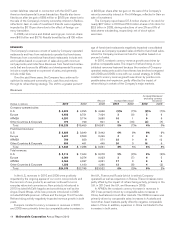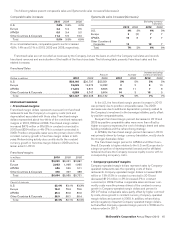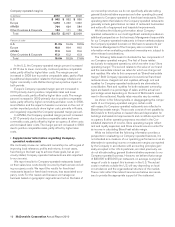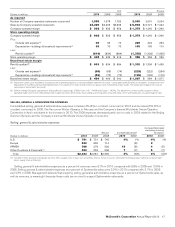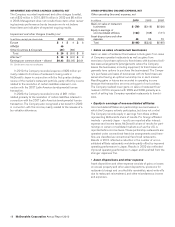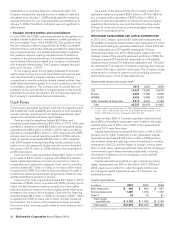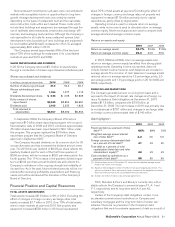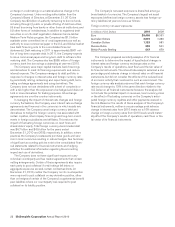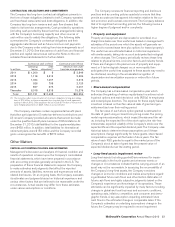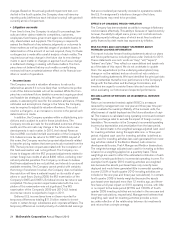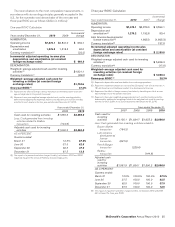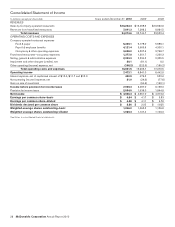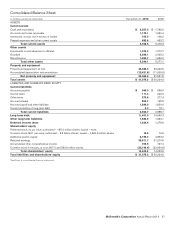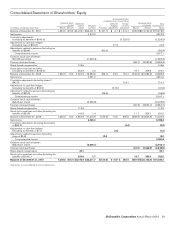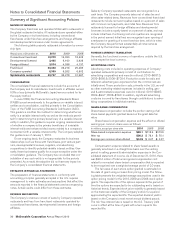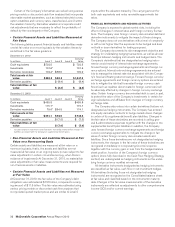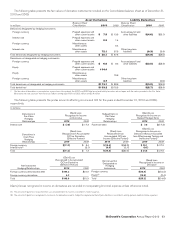McDonalds 2010 Annual Report Download - page 26
Download and view the complete annual report
Please find page 26 of the 2010 McDonalds annual report below. You can navigate through the pages in the report by either clicking on the pages listed below, or by using the keyword search tool below to find specific information within the annual report.charges. Based on the annual goodwill impairment test, con-
ducted in the fourth quarter, the Company does not have any
reporting units (defined as each individual country) with goodwill
currently at risk of impairment.
• Litigation accruals
From time to time, the Company is subject to proceedings, law-
suits and other claims related to competitors, customers,
employees, franchisees, government agencies, intellectual prop-
erty, shareholders and suppliers. The Company is required to
assess the likelihood of any adverse judgments or outcomes to
these matters as well as potential ranges of probable losses. A
determination of the amount of accrual required, if any, for these
contingencies is made after careful analysis of each matter. The
required accrual may change in the future due to new develop-
ments in each matter or changes in approach such as a change
in settlement strategy in dealing with these matters. The Com-
pany does not believe that any such matter currently being
reviewed will have a material adverse effect on its financial con-
dition or results of operations.
• Income taxes
The Company records a valuation allowance to reduce its
deferred tax assets if it is more likely than not that some portion
or all of the deferred assets will not be realized. While the Com-
pany has considered future taxable income and ongoing prudent
and feasible tax strategies, including the sale of appreciated
assets, in assessing the need for the valuation allowance, if these
estimates and assumptions change in the future, the Company
may be required to adjust its valuation allowance. This could
result in a charge to, or an increase in, income in the period such
determination is made.
In addition, the Company operates within multiple taxing juris-
dictions and is subject to audit in these jurisdictions. The
Company records accruals for the estimated outcomes of these
audits, and the accruals may change in the future due to new
developments in each matter. In 2010, the Internal Revenue
Service (IRS) concluded its field examination of the Company’s
U.S. federal income tax returns for 2007 and 2008. As part of
this exam, the Company resolved proposed adjustments related
to transfer pricing matters that were previously received from the
IRS. The tax provision impact associated with the completion of
this field examination was not significant. The Company con-
tinues to disagree with the IRS’ proposed adjustments related to
certain foreign tax credits of about $400 million, excluding inter-
est and potential penalties. The Company continues to believe
that these adjustments are not justified, and intends to pursue all
available remedies. The Company cannot predict with certainty
the timing of resolution; however, the Company does not believe
the resolution will have a material impact on its results of oper-
ations or cash flows. During 2008, the IRS examination of the
Company’s 2005 and 2006 U.S. federal income tax returns was
completed. The tax provision impact associated with the com-
pletion of this examination was not significant. The IRS
examination of the Company’s 2009 and 2010 U.S. federal
income tax returns is expected to begin in 2011.
Deferred U.S. income taxes have not been recorded for
temporary differences totaling $11.0 billion related to invest-
ments in certain foreign subsidiaries and corporate affiliates. The
temporary differences consist primarily of undistributed earnings
that are considered permanently invested in operations outside
the U.S. If management’s intentions change in the future,
deferred taxes may need to be provided.
EFFECTS OF CHANGING PRICES—INFLATION
The Company has demonstrated an ability to manage inflationary
cost increases effectively. This ability is because of rapid inventory
turnover, the ability to adjust menu prices, cost controls and sub-
stantial property holdings, many of which are at fixed costs and
partly financed by debt made less expensive by inflation.
RISK FACTORS AND CAUTIONARY STATEMENT ABOUT
FORWARD-LOOKING INFORMATION
This report includes forward-looking statements about our plans
and future performance, including those under Outlook for 2011.
These statements use such words as “may,” “will,” “expect,”
“believe” and “plan.” They reflect our expectations and speak only
as of the date of this report. We do not undertake to update
them. Our expectations (or the underlying assumptions) may
change or not be realized, and you should not rely unduly on
forward-looking statements. We have identified the principal risks
and uncertainties that affect our performance in the Company’s
filings with the Securities and Exchange Commission, and
investors are urged to consider these risks and uncertainties
when evaluating our historical and expected performance.
RECONCILIATION OF RETURNS ON INCREMENTAL INVESTED
CAPITAL
Return on incremental invested capital (ROIIC) is a measure
reviewed by management over one-year and three-year time peri-
ods to evaluate the overall profitability of the business units, the
effectiveness of capital deployed and the future allocation of capi-
tal. This measure is calculated using operating income and constant
foreign exchange rates to exclude the impact of foreign currency
translation. The numerator is the Company’s incremental operating
income plus depreciation and amortization from the base period.
The denominator is the weighted-average adjusted cash used
for investing activities during the applicable one- or three-year
period. Adjusted cash used for investing activities is defined as
cash used for investing activities less cash generated from inves-
ting activities related to the Boston Market, Latin America
developmental license, Pret A Manger and Redbox transactions.
The weighted-average adjusted cash used for investing activities
is based on a weighting applied on a quarterly basis. These
weightings are used to reflect the estimated contribution of each
quarter’s investing activities to incremental operating income. For
example, fourth quarter 2010 investing activities are weighted
less because the assets purchased have only recently been
deployed and would have generated little incremental operating
income (12.5% of fourth quarter 2010 investing activities are
included in the one-year and three-year calculations). In contrast,
fourth quarter 2009 is heavily weighted because the assets
purchased were deployed more than 12 months ago, and there-
fore have a full year impact on 2010 operating income, with little
or no impact to the base period (87.5% and 100.0% of fourth
quarter 2009 investing activities are included in the one-year and
three-year calculations, respectively). Management believes that
weighting cash used for investing activities provides a more
accurate reflection of the relationship between its investments
and returns than a simple average.
24 McDonald’s Corporation Annual Report 2010


